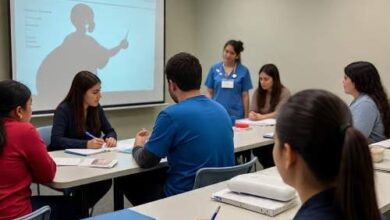How to Get Canada PR for Nurses in 2025: Express Easy Step-by-Step

If you are a nurse dreaming of building your career and life in Canada, understanding the Canada PR for Nurses process in 2025 is a crucial first step. Canada remains one of the top destinations for healthcare professionals due to its growing demand for skilled nurses, excellent working conditions, and pathways to permanent residency.

The good news is that nurses are among the most in-demand occupations under Canada’s immigration system, and the government has created multiple routes to make the journey smoother, especially through the Express Entry program.
This guide will walk you through the step-by-step process of getting Canada PR for Nurses in 2025, starting with eligibility, required documents, and the application stages, all the way to receiving your permanent residency status. Whether you are applying directly from your home country or already working in Canada on a temporary visa, the Express Entry pathway can open doors to a long-term nursing career and eventual citizenship. We will also cover key updates for 2025, including changes in point allocation, healthcare-targeted draws, and how nurses from countries such as Nigeria, India, and the Philippines can maximize their chances of success.
By the end of this guide, you will have a clear understanding of how to create an Express Entry profile, boost your Comprehensive Ranking System (CRS) score, and navigate the application process with confidence. You will also learn about common mistakes that delay applications and practical tips to ensure faster approval. If your goal is to secure Canada PR for Nurses in 2025 and start a rewarding career in one of the world’s most advanced healthcare systems, this article will provide the clarity and direction you need.
Easy Guide: How to Transfer Your Nursing License from Ghana to Canada in 2025 – Full Steps
Why Canada Needs Nurses in 2025
Canada’s healthcare system continues to face a shortage of qualified professionals, and nurses remain at the top of the demand list. According to recent government projections, tens of thousands of nursing positions are expected to open in the next decade due to retirements, population growth, and increased healthcare needs. To address this, Immigration, Refugees and Citizenship Canada (IRCC) has placed nurses under priority categories for permanent residency invitations.
For international nurses, this creates a unique opportunity. Unlike other professions where the competition is extremely high, the Canada PR for Nurses pathway has been streamlined to ensure faster application processing and targeted Express Entry draws. In 2025, Canada has introduced healthcare-specific invitations where nurses often receive priority consideration, making it easier to secure an Invitation to Apply (ITA).
This means that if you are a qualified nurse from countries such as Nigeria, India, the Philippines, or the UK, you are not only eligible but also highly sought after in Canada’s immigration system. With the right documents and preparation, your chances of success are significantly higher compared to other occupations.
Eligibility Requirements for Canada PR for Nurses in 2025
Before applying through Express Entry, nurses must ensure they meet the basic eligibility requirements set by Immigration, Refugees and Citizenship Canada (IRCC). Meeting these conditions increases your chances of creating a strong profile and receiving an Invitation to Apply (ITA).

Below are the key requirements for Canada PR for Nurses in 2025:
1. Education and Nursing Credentials
-
You must hold a recognized nursing degree, diploma, or certificate.
-
Credentials must be assessed by an approved Educational Credential Assessment (ECA) body such as WES, IQAS, or CES.
-
The ECA confirms that your qualification is equivalent to Canadian education standards.
2. Work Experience
-
A minimum of one year of full-time work experience as a registered nurse, licensed practical nurse, or equivalent is required.
-
Work experience must fall under the National Occupational Classification (NOC) codes for nursing, such as NOC 31301 (Registered Nurses) or NOC 32101 (Licensed Practical Nurses).
-
International and Canadian nursing experience are both accepted.
3. Language Proficiency
-
Nurses must prove proficiency in English or French through tests such as IELTS, CELPIP, or TEF Canada.
-
For IELTS, a minimum score of CLB 7 is generally required, but higher scores improve your CRS ranking.
4. Proof of Funds
-
Applicants must show they have enough savings to support themselves and their family after landing in Canada.
-
The required amount depends on family size and is updated annually by IRCC.
- Ultimate guide: Nurse Salary in Canada 2025: Annual Pay, ADN vs BSN, and Income Breakdown
5. Nursing License Registration (Optional but Advantageous)
-
While not required before applying for PR, starting the licensing process with the National Nursing Assessment Service (NNAS) can strengthen your profile.
-
It demonstrates commitment to practicing in Canada and may support job offers, which increase CRS points.
6. Age and Adaptability
-
Applicants between the ages of 21 and 35 usually score the highest CRS points for age.
-
Additional adaptability points can be earned if you have relatives in Canada, previous study/work experience, or a valid job offer.
By meeting these eligibility requirements, you position yourself as a competitive candidate in the Express Entry pool and increase your chances of being selected under healthcare-targeted draws.
Step-by-Step Process: How Nurses Can Apply for Canada PR via Express Entry in 2025
Applying for Canada PR for Nurses through the Express Entry system may feel overwhelming at first, but breaking it down into clear stages makes the process manageable.

Below is a detailed step-by-step guide for 2025:
Step 1: Check Your Eligibility
-
Use the official IRCC eligibility tool to confirm if you qualify under the Federal Skilled Worker Program (FSWP) or Canadian Experience Class (CEC).
-
Nurses are generally classified under NOC 31301 (Registered Nurses) or NOC 32101 (Licensed Practical Nurses).
Step 2: Get Your Educational Credentials Assessed (ECA)
-
Submit your nursing degree or diploma to an authorized body like WES, IQAS, or CES.
-
The ECA ensures your education is recognized as equivalent to Canadian standards, which is a mandatory step before creating your Express Entry profile.
Step 3: Take an Approved Language Test
-
Write the IELTS General Training or CELPIP for English, or TEF/TCF for French.
-
Aim for at least CLB 7 or higher to maximize CRS points. Stronger language scores give you a better chance during targeted healthcare draws.
Step 4: Create an Express Entry Profile
-
Once you have your ECA and language results, you can create an online profile on the IRCC portal.
-
The system will assign you a Comprehensive Ranking System (CRS) score based on your age, education, work experience, and language ability.
Step 5: Enter the Express Entry Pool
-
After submission, you will join other candidates in the pool.
-
Nurses often benefit from category-based draws targeting healthcare workers in 2025, improving chances of receiving an Invitation to Apply (ITA).
Step 6: Receive an Invitation to Apply (ITA)
-
If your CRS score meets the cutoff or if you are selected in a healthcare-targeted draw, you’ll receive an ITA.
-
You must submit your complete application for permanent residence within 60 days.
Step 7: Submit Your PR Application and Supporting Documents
-
Provide documents such as your passport, police clearance certificates, medical exams, proof of funds, work experience letters, and ECA.
-
Double-check all documents to avoid delays or rejection.
Step 8: Wait for Processing and Final Decision
-
IRCC aims to process most Express Entry applications within six months.
-
If approved, you will receive a Confirmation of Permanent Residence (COPR) and can prepare to move to Canada.
By carefully following these steps, nurses can successfully navigate the Express Entry system and secure their Canada PR for Nurses in 2025.
Pediatric Nurses in Canada Are Earning Unbelievable Salaries in 2025 – See the Full Breakdown
Documents Checklist for Nurses Applying for Canada PR in 2025
One of the most important parts of applying for Canada PR for Nurses is ensuring that all required documents are ready before submission. Missing or incorrect paperwork is one of the leading causes of delays or refusals in Express Entry applications. Below is a detailed checklist tailored for nurses in 2025:
1. Identity and Civil Status Documents
-
Valid passport (with sufficient validity for the application process).
-
Birth certificate.
-
Marriage certificate, divorce papers, or death certificate (if applicable).
-
Proof of dependents (children’s birth certificates, adoption papers, etc.).
2. Educational Documents
-
Nursing degree, diploma, or certificate.
-
Transcripts from your nursing school or university.
-
Educational Credential Assessment (ECA) report from an authorized body such as WES, IQAS, or CES.
3. Professional and Work Experience Documents
-
Reference letters from employers detailing job title, duties, work hours, and salary.
-
Nursing license or registration certificate from your home country.
-
Proof of employment such as contracts, payslips, or tax records.
4. Language Proficiency Results
-
Official IELTS General Training or CELPIP results for English.
-
TEF or TCF results if applying with French proficiency.
-
Test results must be less than two years old at the time of application.
5. Proof of Funds
-
Recent bank statements showing the required settlement funds.
-
Letters from financial institutions confirming account balances and history.
-
Fixed deposits, savings accounts, or other liquid financial assets.
6. Medical and Police Certificates
-
Medical exam results from a panel physician approved by IRCC.
-
Police clearance certificates from every country you have lived in for six months or more after the age of 18.
7. Additional Supporting Documents (Optional but Recommended)
-
Evidence of relatives in Canada (PR card, citizenship certificate, or passport).
-
Job offer letter from a Canadian employer (if available).
-
NNAS (National Nursing Assessment Service) registration documents if you have started the licensing process.
Having these documents prepared in advance will not only speed up your application but also reduce the chances of rejection. Organize them carefully, scan them clearly, and ensure all translations (if required) are certified.
Proven Guidelines: How to Prepare for CELBAN Speaking in Canada (2025)
Processing Time and Costs for Canada PR for Nurses in 2025
Understanding how long the process takes and how much it will cost is essential before starting your Canada PR for Nurses journey. In 2025, the Canadian government continues to prioritize healthcare workers, which often shortens processing times compared to other occupations.

However, applicants should still plan for both time and expenses carefully.
Processing Time
-
Express Entry Applications: IRCC’s standard processing time for Express Entry applications is around six months from the date you submit your complete PR application after receiving an Invitation to Apply (ITA).
-
ECA (Educational Credential Assessment): This can take 6–12 weeks, depending on the assessing body and how quickly your school provides documents.
-
Language Test Scheduling and Results: About 2–8 weeks, depending on test availability and location.
-
Police Certificates and Medical Exams: Usually completed within 2–6 weeks, though this varies by country.
👉 In total, most nurses can expect the process to take 8–12 months from start to finish if all documents are submitted correctly and on time.
Costs Involved
Below is an estimate of the common costs for nurses applying for Canada PR in 2025:
-
ECA (Educational Credential Assessment): CAD $200–$300
-
Language Test (IELTS/CELPIP): CAD $250–$350
-
Express Entry Application Fee: CAD $1,525 (including biometrics)
-
Right of Permanent Residence Fee (RPRF): CAD $575
-
Medical Exam: CAD $100–$300 (varies by country)
-
Police Clearance Certificates: CAD $20–$100 each, depending on issuing country
-
Proof of Funds (minimum settlement funds 2025): ~CAD $13,757 for a single applicant; higher amounts required for families (updated yearly by IRCC)
Optional Costs
-
NNAS Registration (if starting Canadian nursing license process early): CAD $650+
-
Translation of Documents: Costs vary depending on language and volume of documents.
While the initial investment may feel high, securing Canada PR for Nurses offers long-term benefits such as stable employment, family sponsorship, free public healthcare, and a pathway to citizenship.
Best Guide: Which English Test is Easier CELBAN or IELTS for Nurses in Canada 2025
Common Mistakes Nurses Should Avoid During Canada PR Application
Even though the Canada PR for Nurses pathway is one of the most straightforward immigration routes, many applicants face delays or even refusals due to preventable errors. Knowing the most common mistakes and how to avoid them can save you time, money, and unnecessary stress.
1. Submitting Incomplete or Incorrect Documents
-
Missing transcripts, outdated police certificates, or unclear scans often cause delays.
-
Always double-check IRCC’s official document checklist and ensure translations are certified.
2. Using Expired Test Results
-
Language test results (IELTS, CELPIP, TEF, TCF) are valid for two years only.
-
Submitting an expired score will make your Express Entry profile ineligible.
3. Not Meeting Proof of Funds Requirement
-
Many nurses underestimate the settlement funds required by IRCC.
-
Ensure your bank statements clearly show the minimum required balance and that the money is readily available, not tied up in loans or fixed assets.
4. Incorrect NOC Code Selection
-
Nurses fall under NOC 31301 (Registered Nurses) and NOC 32101 (Licensed Practical Nurses).
-
Choosing the wrong code or providing duties that do not match the official NOC description can lead to rejection.
5. Ignoring CRS Score Improvement Opportunities
-
Some applicants apply too quickly with low scores and miss out on strategies to increase their CRS, such as retaking language tests, securing a provincial nomination, or gaining a valid job offer in Canada.
6. Delaying Police and Medical Certificates
-
These documents are mandatory and can take weeks to obtain. Waiting until the last minute often causes missed deadlines.
7. Relying on Unauthorized Agents
-
Many nurses lose money to unregulated immigration agents. Only use IRCC-approved representatives (RCICs or Canadian lawyers) if you choose professional help.
By avoiding these mistakes, you will increase your chances of success and ensure your Canada PR for Nurses application moves smoothly through the Express Entry system.
Benefits of Canada PR for Nurses in 2025
Securing Canada PR for Nurses in 2025 is not just about moving to another country — it’s about unlocking long-term career opportunities, stability, and a better quality of life. Below are the major benefits that make this pathway highly attractive for nurses around the world:
1. Secure Permanent Residency Status
-
As a PR holder, you have the legal right to live, work, and study anywhere in Canada.
-
Unlike temporary visas, permanent residency gives you long-term security and a clear pathway to Canadian citizenship.
2. High Demand and Job Security
-
Nurses are among the most in-demand professionals in Canada.
-
With thousands of vacancies expected in hospitals, clinics, and long-term care facilities, nurses enjoy job stability and competitive salaries.
3. Access to Free Healthcare and Social Benefits
-
As a PR holder, you and your family gain access to Canada’s publicly funded healthcare system.
-
Additional benefits include child tax credits, parental leave, and social assistance if needed.
4. Opportunities for Family Sponsorship
-
Once you become a permanent resident, you can sponsor your spouse, partner, and children to join you in Canada.
-
This ensures that your whole family can benefit from education, healthcare, and job opportunities.
5. World-Class Education for Children
-
PR holders do not pay international student tuition fees for primary and secondary education.
-
Your children can access world-class universities and colleges at much lower costs compared to international students.
6. Pathway to Canadian Citizenship
-
After living in Canada for three out of five years as a PR, you can apply for Canadian citizenship.
-
Citizenship provides the added benefits of a Canadian passport, voting rights, and full participation in civic life.
7. Better Quality of Life
-
Canada is consistently ranked as one of the best countries for quality of life.
-
With safe communities, a multicultural environment, and opportunities for professional growth, it’s an ideal destination for nurses seeking both career advancement and personal fulfillment.
In short, applying for Canada PR for Nurses in 2025 is more than an immigration process — it is an investment in your future and your family’s future.
Conclusion: Final Tips for Nurses Applying for Canada PR in 2025
The journey to securing Canada PR for Nurses in 2025 may seem complex, but with proper planning, accurate documentation, and a clear understanding of the Express Entry process, success is well within reach. Canada continues to prioritize healthcare professionals, making this one of the best times for nurses to pursue permanent residency and a stable future abroad.
To maximize your chances, remember these final tips:
-
Start Early: Begin preparing your documents such as ECAs, IELTS results, and police clearances in advance.
-
Aim Higher in CRS: Don’t settle for the minimum score. Retaking language tests or exploring provincial nomination programs (PNPs) can significantly boost your CRS ranking.
-
Stay Updated: Immigration rules change regularly. Always verify the latest updates directly from the official IRCC website.
-
Avoid Mistakes: Double-check your application, ensure correct NOC codes, and never rely on unverified agents.
-
Plan Financially: Budget realistically for application fees, settlement funds, and initial living costs in Canada.
By following the step-by-step process and avoiding common pitfalls, you can turn your dream of working and living in Canada into reality. Whether you are applying from Nigeria, India, the Philippines, or any other part of the world, the opportunities in Canada’s healthcare system are vast and promising.
In 2025, the demand for nurses in Canada is higher than ever, and with Express Entry’s healthcare-targeted draws, your chances of receiving an Invitation to Apply have never been better. Take action today, prepare thoroughly, and soon you could be building a rewarding nursing career while enjoying the many benefits of life in Canada.
Official Government & Immigration Resources
-
Immigration, Refugees and Citizenship Canada (IRCC) – Express Entry Overview
https://www.canada.ca/en/immigration-refugees-citizenship/services/immigrate-canada/express-entry.html -
IRCC – Proof of Funds Requirement (Updated Annually)
https://www.canada.ca/en/immigration-refugees-citizenship/services/immigrate-canada/express-entry/documents/proof-funds.html -
National Occupational Classification (NOC) for Nurses
https://www.jobbank.gc.ca/noc -
IRCC – Processing Times Tool
https://www.canada.ca/en/immigration-refugees-citizenship/services/application/check-processing-times.html -
National Nursing Assessment Service (NNAS) – Licensing for Internationally Educated Nurses
https://www.nnas.ca/
Educational Credential Assessment (ECA) Bodies
-
World Education Services (WES) Canada
https://www.wes.org/ca/ -
International Qualifications Assessment Service (IQAS)
https://www.alberta.ca/iqas.aspx -
Comparative Education Service (CES) – University of Toronto
https://learn.utoronto.ca/ces
Language Test Providers
-
IELTS – Official Test Information
https://www.ielts.org/ -
CELPIP – Canadian English Language Proficiency Index Program
https://www.celpip.ca/ -
TEF Canada (French Language Test)
https://www.lefrancaisdesaffaires.fr/en/tests-diplomas/tef-canada/
Additional Trusted Sources
-
Canadian Nurses Association (CNA) – Nursing in Canada
https://www.cna-aiic.ca/ -
Canadian Information Centre for International Credentials (CICIC)
https://www.cicic.ca/ -
Job Bank Canada – Nurse Labour Market Outlook
https://www.jobbank.gc.ca/trend-analysis/search-occupations
Frequently Asked Questions (FAQ) on Canada PR for Nurses 2025
Yes. Nurses are among the top in-demand professionals in Canada due to ongoing shortages in hospitals, clinics, and long-term care facilities. Healthcare-targeted Express Entry draws in 2025 prioritize nurses for permanent residency.
No. Proof of English or French language proficiency is mandatory for Express Entry. IELTS General Training, CELPIP, or TEF/TCF (for French) are required tests. However, a higher score increases your CRS ranking.
On average, the process takes 8–12 months, including time for ECA, language tests, Express Entry pool entry, and IRCC processing.
The CRS cutoff changes in every draw. For healthcare-targeted draws, nurses may qualify with lower CRS scores than general draws, but aiming for 470+ points increases chances of selection.
No. Registration with the National Nursing Assessment Service (NNAS) or provincial regulators is not required before applying for PR. However, beginning the process early can help secure job offers and boost your profile.
In 2025, a single applicant must show around CAD $13,757. The required amount increases with family size and is updated annually by IRCC.




2 Comments